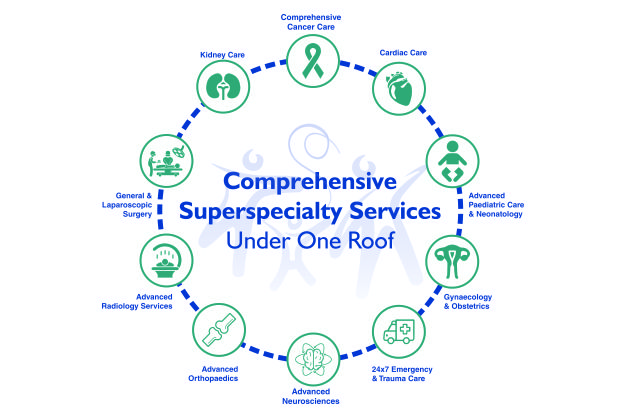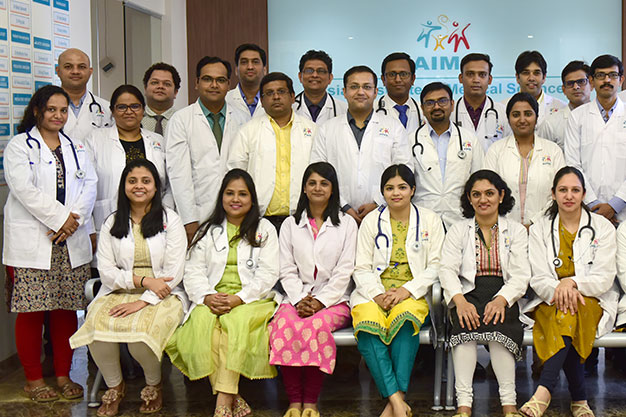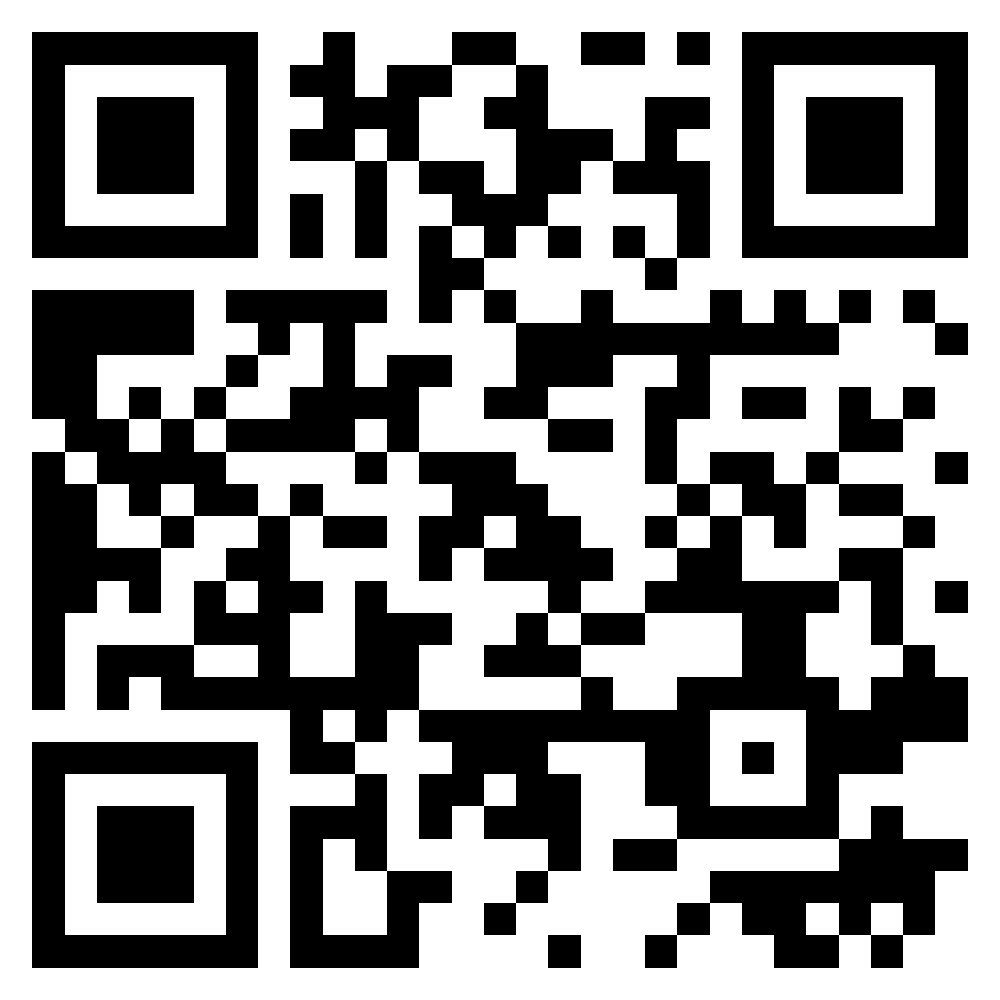Overview
AIMS Hospital has performed a multitude of treatments and procedures in cardiology and cardiothoracic surgery.
Our team of cardiologists and cardiothoracic surgeons is highly trained and is completely dedicated to the treatment of heart diseases. Our pioneering work for the prevention and treatment of cardiac diseases has led to the achievement of better outcomes and improved quality of life for thousands of cardiac patients who visit us each year with complex heart problems. Our advanced infrastructure supports the complex nature of the cardiac care provided. Third-generation Cath Lab, Cardiac Critical Care Units, and Intensive Care Units support our experienced cardiologists and post-operative care teams, making us the most sought-after Cardiology hospital.
Highlights
We have vast experience in the most complicated coronary artery bypass surgery, surgery for all types of valvular heart diseases, pediatric heart surgery with success rates comparable to international standards. We have been ranked among one of the best hospitals in Cardio Sciences in the Mumbai region through various prestigious surveys. Our cardiologists are pioneers in Coronary Artery Stenting, Laser Angioplasty, and techniques as advanced as Percutaneous Transluminal Septal Myocardial Ablation. In addition, this center has special programs that offer minimally-invasive valve replacement, i.e., key-hole surgery, beating heart coronary artery bypass grafting, and awake cardiac surgery.
Comprehensive Cardiac Care
- State-of-the-art Operation Theatres & Cath lab
- Primary emphasis on Angioplasty in golden hour
- Angiography and Angioplasty
- 128 slice Cardiac CT Scan
- CABG & Valve Replacement
- Pacemaker
- Trans Esophageal Echocardiography (TEE)
- Fetal &Paediatric 2D Echo
- Holter Monitor
- Dobutamine Stress Echo (DSE)
- ECMO
- Stress Test
Adult CVTS (Cardiothoracic & Vascular Surgery)
Diagnosis & treatment of health conditions related to heart, lungs, and chest cavity
Surgical interventions that are performed to treat heart ailments are commonly known as cardiac surgery. The renowned team of the Cardiothoracic Vascular Surgery Department (CTVS) specializes in diagnosing and treating various complex and difficult-to-treat cardiothoracic disorders with perfection. Some of the common heart surgeries performed by the team include–
Aortic Surgery - Carried out to repair/replace aortic aneurysms & dissections
Aortic Valve Surgery is performed to repair or replace the aortic valve. The surgery can be carried out in the following different ways:
- Endoscopic
- Non-Sternotomy
- MAZE Procedures for AF
Arrhythmia surgery - A surgical procedure to correct irregular heart rhythms such as atrial fibrillation or ventricular tachycardia.
Corrective surgery to fix or treat a genetic heart defect or congenital heart surgery.
Coronary Artery Bypass Graft (CABG) - Commonly known as Heart Bypass Surgery/ Coronary Bypass surgery, is a surgical procedure that creates alternate routes for blood to flow to the heart tissue, bypassing the narrowed/blocked arteries (leading to what is known as Coronary Artery Disease). For the procedure, a healthy blood vessel (also called a graft) is taken from one area of the patient’s own body and is placed around the narrowed/blocked area to restore blood flow to the heart. The goal of this procedure is to relieve symptoms of coronary artery disease (including angina), enable the patient to resume a normal lifestyle, and to lower the risk of a heart attack or other heart problems.
Surgery for heart failure
- LVAD or Left ventricular assist device - A device that aids in the pumping function, thereby circulating blood inside the body.
- Left ventricular remodeling /surgical ventricular restoration – This is a technique that provides the heart with a more normal shape post a MI, allowing the heart to pump blood efficiently.
- Heart transplant - A surgery to treat end-stage heart failure - a condition that occurs when the heart can't pump enough oxygenated blood to meet the needs of the body's organs.
Awake heart surgeries (on or off-pump cardiac surgeries under high thoracic epidural without general anesthesia)
Cardiothoracic and vascular procedures/surgery
- Bypass surgery
- Off-pump
- Keyhole - Major Aortic Cardiac Aneurysm Surgeries
- Minimal access aortic arch replacement
- Aortic surgery
- Hybrid
- Endovascular aortic surgery
At AIMS, we are equipped with dedicated Cardiothoracic ICUs with up to a 1:1 nursing ratio, 24X7. Each ICU is equipped with the following facilities:
- Color Doppler system
- Echocardiography (ECG) system
- Continuous oxygen supply
- Infusion pumps
- Defibrillator
- Ventilators
- Pressure monitoring systems
- Temporary pacemaker both transdermal and transvenous
- Intra-aortic balloon pump
- ABG (Blood Gas machine)
- Electrolytes analysis machines
Interventional Cardiology
Expert treatment of heart-related disorders with the minimally invasive procedure to approach
Interventional cardiology is a non-surgical branch of Cardiac sciences wherein the procedure is performed with the help of a catheter – a flexible and small tube. These types of procedures are utilized to fix or repair weakened or damaged blood vessels, clogged arteries, or other affected parts in the heart structure. The Team specializes in rendering various interventional services with superlative quality services and utmost care. Some of the common conditions treated by the department are as mentioned:
Coronary artery disease: A narrowing of the arteries which supply the heart muscle with blood and oxygen.
Heart valve disease: Occurs when the valves which control blood flow into the heart’s chambers are not working correctly.
Peripheral vascular disease: The heart can also be affected by clogged or hardened veins and arteries that are in other parts of the body.
Interventional cardiology procedures performed at AIMS include:
- Angiography and Angioplasty of arteries of neck, leg, arm, and kidney
- Heart failure device and AICD implantation
- Coronary Angiography, Angioplasty, and Stenting
- ASD, VSD, PDA device closure
- Permanent Pacemaker (Single and Double Chamber)
- Endovascular aneurysm repair
Invasive Cardiology
The department of Cardiac sciences deals with the study of the heart and its blood vessels. The cardiac sciences team consists of diligent and dedicated Cardiac surgeons, Cardiologists, Interventional Radiologists, Cardiothoracic Surgeons, and highly trained nurses. The team ensures to deliver excellent services for the patients suffering from heart diseases along with proper monitoring, accurate diagnosis, management, treatment, and rehabilitation services. The highly skilled team of cardiac surgeons focuses on treating its patients with utmost care and expertise. The team specializes in performing various invasive cardiac surgeries with perfection some of which are as mentioned:
- Mitral valve repair and replacement
- Atrial septal defect and patent foramen ovale closure
- Maze procedure for atrial fibrillation
- Aortic valve replacement
- Thoracotomy
- Tricuspid valve repair and replacement
- Coronary artery bypass surgery
These procedures are invasive procedures and are performed with the help of the latest and advanced techniques such as laparoscopic or robotic. This new advancement in the field of cardiac sciences has resulted in scar-less surgery along with minimal blood loss, less tissue trauma, speedy recovery of the patient, and lower risk of infections. The team ensures to render quality and superlative care to all its patients irrespective of their age group.
Non Invasive Cardiology
Diagnosis and treatment of heart related disorders using pathology and radiology testing
The branch of Non-Invasive Cardiac Sciences deals with a variety of cardiac procedures and is involved in detecting and treating the problems without using any fluids, injections, or any type of body piercing instruments. The team specializes in providing crucial diagnoses and early treatment options to patients of all age groups. The services offered by the department are superior in quality and are available for both outpatients and inpatients. Some of such services provided are as mentioned:
- Stress Echocardiogram
- Transoesophageal Echocardiogram (TEE)
- Dobutamine Stress Echocardiogram (DSE)
- CT Angiography
- Exercise Stress Test with Nuclear Imaging
- Implantable Cardioverter/Defibrillators and Pacemaker Interrogation
- Heart monitors/Holter monitor
The team is an expert in using the finest and efficient technologies to ensure complete patient comfort, safety, and satisfaction. The accurate diagnosis and dedicated treatment of various cardiac problems by the expert team help save the lives of many patients due to early management of the disease.
Paediatric Cardiac Sciences
AIMS has a specialized and dedicated multi-disciplinary team of paediatric cardiologists including paediatric intensivists, anaesthesiologists, and paediatric surgeons. The team is extremely dedicated to working towards child cardiac care. Several new and efficient cardiac techniques have been pioneered for children by the paediatric team. The department caters to extensive echocardiographic work related to children and focuses on the early detection of various cardiac disorders in unborn babies using specialized echocardiography techniques. The team specializes in managing cardiac diseases at the time of birth along with other congenital defects, some of which are mentioned as under:
- Cardiac valve disorders
- Atrial or ventricular septal defects
- Patent Ductus Arteriosus
- Hypoplastic Left Heart Syndrome
- Blue Baby Syndrome which is caused by Tetralogy of Fallot
- Displacement of the aorta
- Congenital cardiac defects which might have some life-long effects on the health of the child
The doctors are highly qualified and use the latest technologies with minimally invasive techniques for scar-less surgery and fast recovery. We ensure compassionate care and safety of our patients
Vascular Surgery
Diagnosis and treatment of arterial, venous, and lymphatic systems
The department of Vascular surgery deals with diseases of the vascular system which includes the blood vessels- veins, arteries, and lymphatic system. The highly skilled vascular and endovascular surgeons treat various types of blood vessel problems and lymphatic system conditions (vascular diseases) fully to restore the maximum health and well-being of all aged patients. The extensive experience and expertise, coupled with the team approach and research prowess enable the team to deliver successful treatment outcomes each time. Some of the common procedures performed by the team are as follows:
- Arm Artery Disease
- Aortic Dissection
- Abdominal Aortic Aneurysm
- Connective Tissue Disorder (CTD)
- Chronic Venous Insufficiency
- Portal Hypertension
- Giant Cell Arteritis
- Deep Vein Thrombosis
- Peripheral Arterial Disease
- Vascular Infections
- Varicose Veins
- Vascular Trauma
The team ensures to treat all patients with quality care by using advanced techniques to help them recover faster.
Emergency Cardiac Surgery
Surgeries for treatment of complications caused by the dilatation of the aorta (aortic aneurysm), problems caused by irregular heartbeat (arrhythmias – such as atrial fibrillation), heart failure, Marfan syndrome – a genetic disorder that causes cardiovascular abnormalities and other less common conditions are performed extensively.
Cath Lab
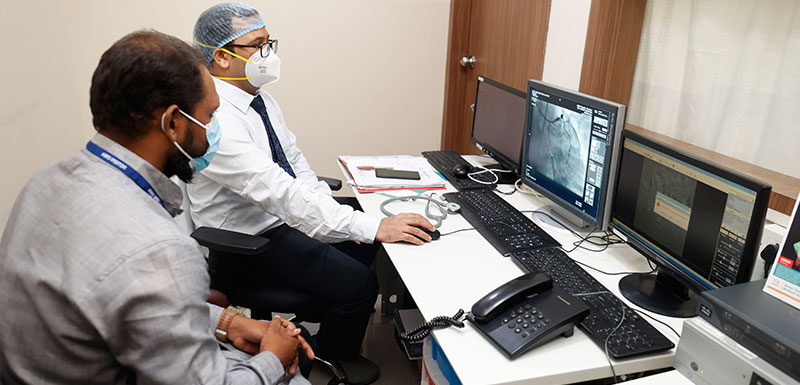
What is a Cath Lab?
The Catheterization Laboratory or Cath Lab is an examination room in a hospital or clinic with diagnostic imaging equipment used to support the catheterization procedure.
A catheter is inserted into a large artery, and various wires and devices can be inserted through the body via the catheter which is inside the artery.
The Cath Lab is well equipped with the advanced Siemens Machine. The Hospital is having a team of highly qualified and experienced Cardiologists and Intensivists.
Applications of Cath Lab for various Procedures:
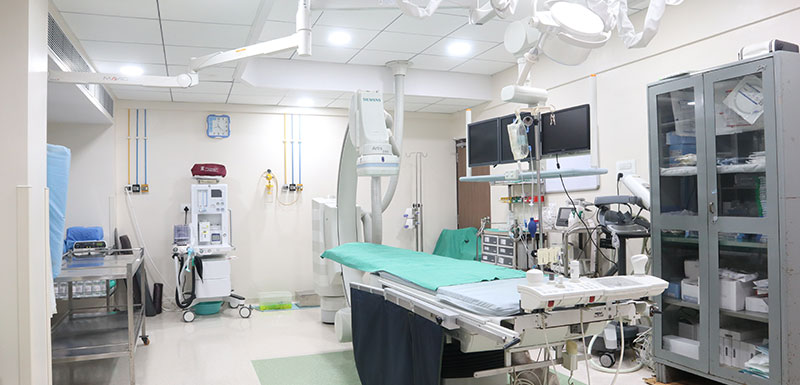
Cardiac Procedures:
Coronary catheterization is a minimally invasive procedure to study the status of the blood vessels of the Heart and to repair them in case of obstruction or clot leading to a Heart Attack.
Most Cath lab procedures are performed under local anesthesia.
Neuro (Brain) Procedures:
An angiogram of the Brain (Carotid angiogram) is done to study the large arteries that supply blood to the brain in the patient suffering from Stroke/Paralytic Attacks.
Procedures Conducted in Cathlab:
- Coronary Angiography
- Coronary Angioplasty
- ASD/VSD closure
- Permanent / Temporary Pacemaker implantation
- Carotid Angiography / Angioplasty (for Brain)
- DSA (Digital Subtraction Angiography)
- Renal Angiogram
- IVC Filter
- Peripheral Angiogram / Angioplasty
- Biliary Stenting
OCT
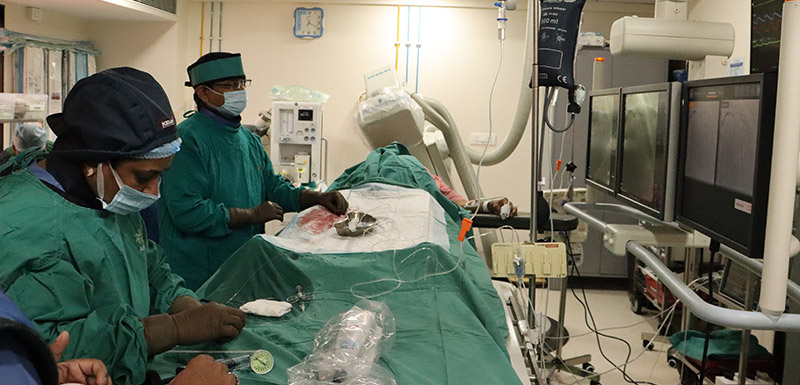
Optical coherence tomography (OCT) is a diagnostic procedure that is used during cardiac catheterization. Unlike ultrasound, which uses sound waves to produce an image of the blood vessels, OCT uses light.
What is the OCT used for?
Optical coherence tomography (OCT) is a noninvasive imaging method that uses reflected light to create pictures of the back of your eye. It can be used to diagnose and manage diseases like diabetes-related retinopathy and glaucoma.
What are the benefits of OCT coronary?
The superior resolution of OCT helps in identifying the characteristics of the lesion such as thrombotic debris, dissection, calcified nodules, and calcium requiring lesion preparation, plaque erosion, rupture, and TCFA that lead to acute coronary syndromes (ACS).
How does OCT angiography work?
With OCT-A technology, the same tissue area is repeatedly imaged and differences are analyzed between scans (over time), thus allowing one to detect zones containing high flow rates (i.e. with marked changes between scans) and zones with slower, or no flow at all, which will be similar among scans.
Cardiovascular optical coherence tomography (OCT) is a catheter-based invasive imaging system. Using light rather than ultrasound, OCT produces high-resolution in vivo images of coronary arteries and deployed stents. This comprehensive review will assist practicing interventional cardiologists in understanding the technical aspects of OCT based upon the physics of light and will also highlight the emerging research and clinical applications of OCT. Semi-automated imaging analyses of OCT systems permit accurate measurements of luminal architecture and provide insights regarding stent apposition, overlap, neointimal thickening, and, in the case of bio absorbable stents, information regarding the time course of stent dissolution. The advantages and limitations of this new imaging modality will be discussed with emphasis on key physical and technical aspects of intracoronary image acquisition, current applications, definitions, pitfalls, and future directions.
Specialists
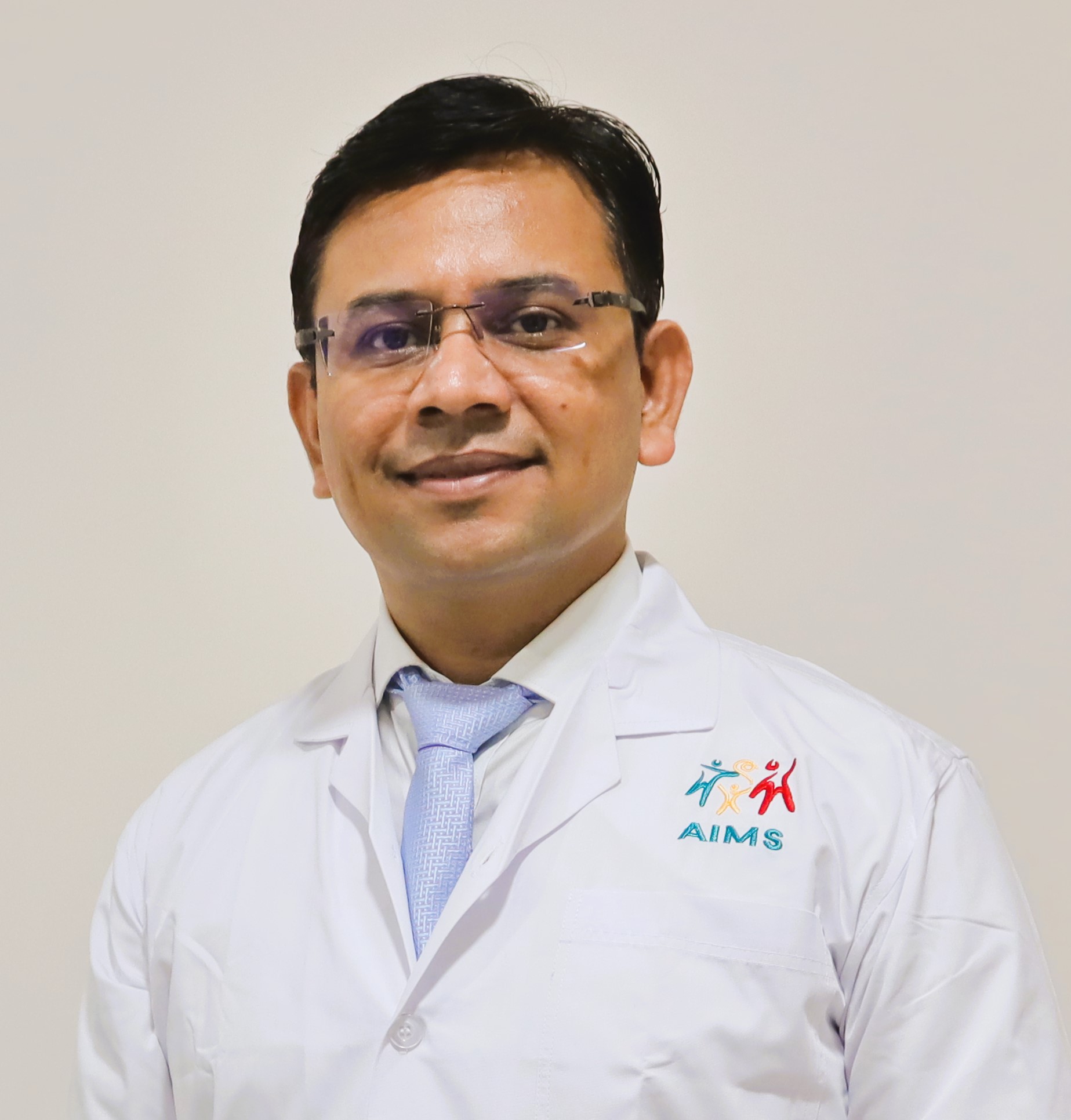
DR. GAJANAN GAWANDE-PATIL
INTERVENTIONAL CARDIOLOGIST
M.D. (General Medicine), D.M. (Interventional Cardiology)
View details
Appointment
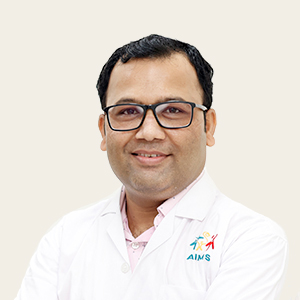
DR. LAXMAN GAIKWAD
INTERVENTIONAL CARDIOLOGIST
M.D. (General Medicine), D.M. (Cardiology)
View details
Appointment
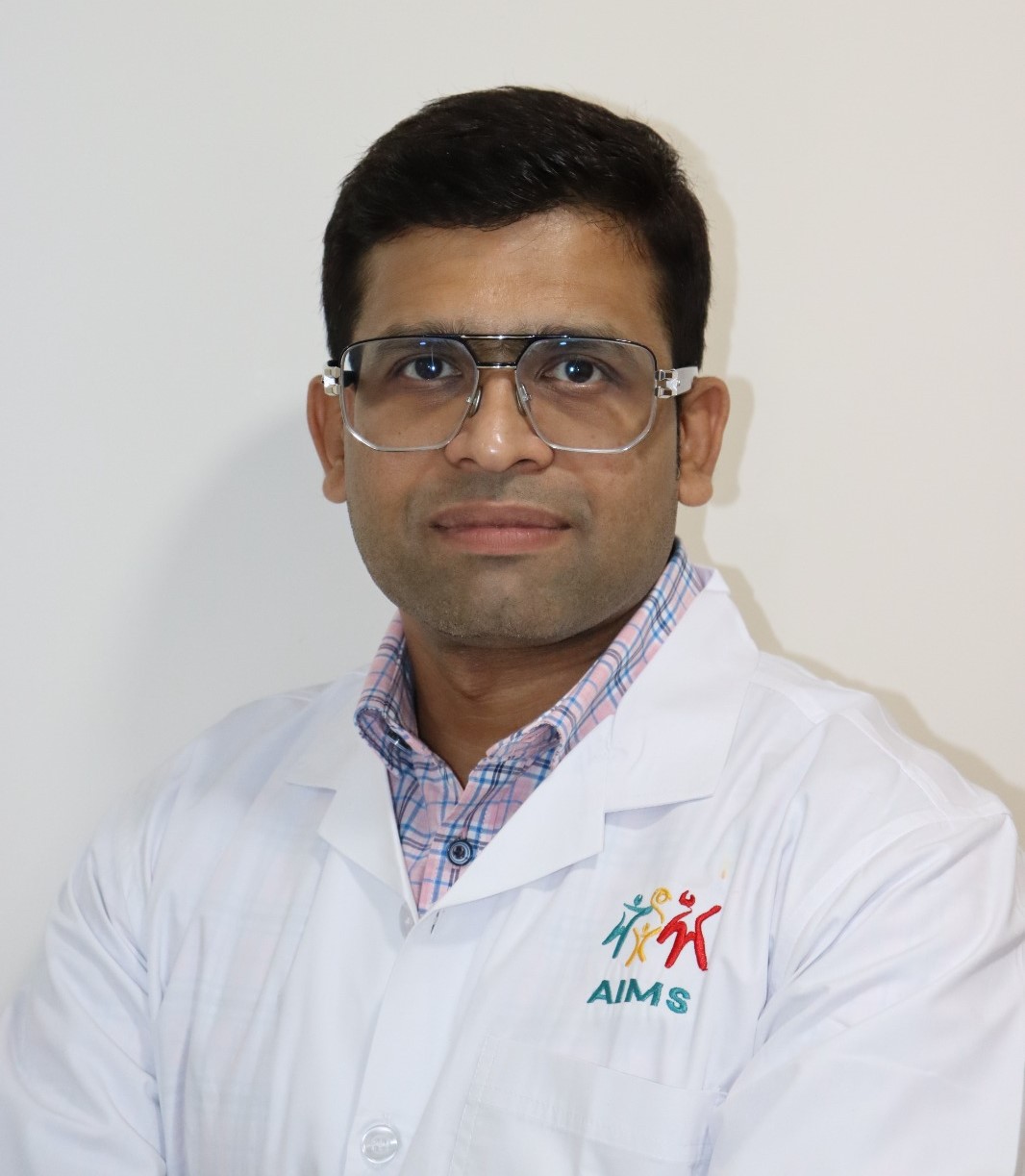
DR. PANKAJ POHEKAR
CARDIO VASCULAR & THORACIC SURGEON
M.S. (General Surgery), M.Ch. (CVTS)
View details
Appointment
ABOUT US
About AIMSDirector's Message
Vision & Mission
Accreditations
Awards & Accolades
Our Network
Phone Directory
Designed by Web Creations 2022. All rights reserved.


